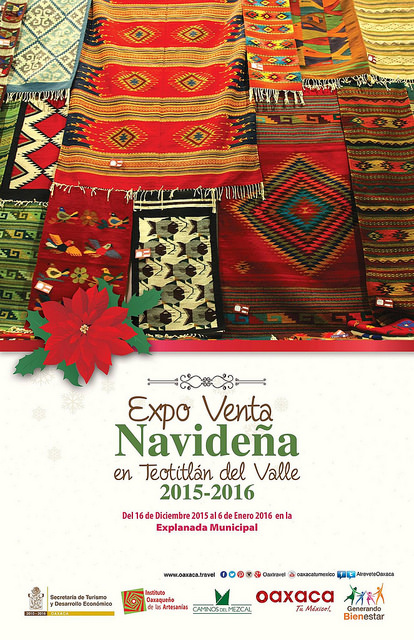A non-profit organization in Oaxaca called Fundacion en Vía seeks to promote businesses run by women through microfinance loans and education programs. A story in the Huffington Post last week by Carly Schwartz described the program run by En Via that organizes visits by tourists, including the journalist, to tapestry studios and other businesses of Zapotec women.

The journalist spent a day in Teotitlán del Valle, a Zapotec town in the state of Oaxaca in southern Mexico that is famous for its weaving industry—and for its tourism. Ms. Schwartz described sitting cross-legged in the showroom of Isabel Martinez Mendoza, whose colorful tapestries are prepared with dyes made from fruits and crushed nutshells. The author noted the stacks of tapestries and blankets for sale, and watched the lady’s 80-year old mother preparing wool for spinning. About a dozen other tourists were sitting there with her.
The elderly lady, dressed in a traditional Zapotec smock, held up a handful of wool that she was preparing to spin plus a wire paddle that she was using to smooth it out. She offered to let the tourists give it a try. The tourists passed the wool around the room and tried to mimic her motions.
The fees that En Vía collects from the tourists are used to make small loans to women in Oaxaca who otherwise would not have access to funding. With the help of the loans, the women can expand their operations. The organization also provides weekly training sessions to educate them on financial and management strategies.
Ms. Schwartz wrote that each tourist has paid $50.00 for the guided day trip to visit a community in Oaxaca, including opportunities to meet the women who have received the microloans. Product demonstrations, food tasting, and in-depth conversations with the women are all part of the daily tours, which are led by volunteers six days of the week.
The author made it clear she was impressed by the programs run by En Vía. In contrast to much tourism, where clueless visitors sometimes arouse animosities through their rudeness, the tours run by the organization foster human connections across cultures. Their model facilitates advantages for both sides of the cultural encounters, Schwartz argued. The En Vía clients benefit from having received the loans while the tourists profit from having genuine encounters with the indigenous people of Oaxaca.
Carlos Hernandez Topete, a native of Oaxaca who founded Fundacion En Vía, told Ms. Schwartz, “Responsible tourism means striving to improve the well-being of the communities we work with.” He founded the organization in the belief that Oaxaca, a poor but beautiful section of Mexico, would be an ideal place to test the concept of microfinance tourism.
As part of her day in the state, Schwartz learned a lot about human connections when one woman showed a tourist how she flattens corn into tortillas, another woman spoke about the way she makes sheep cheese, and a third joined the tourist group at a table as they ate her chicken mole enchiladas and explained that the tour groups motivated her to keep her business going as effectively as possible.